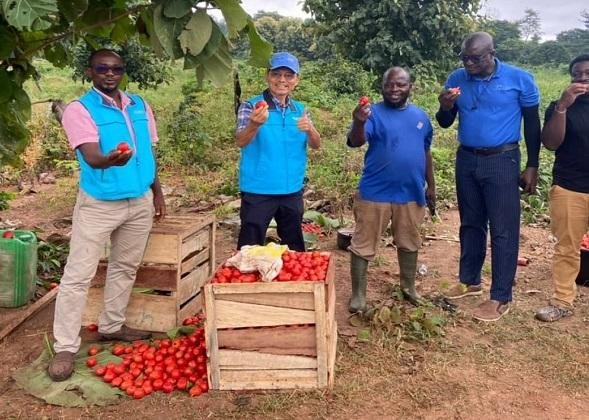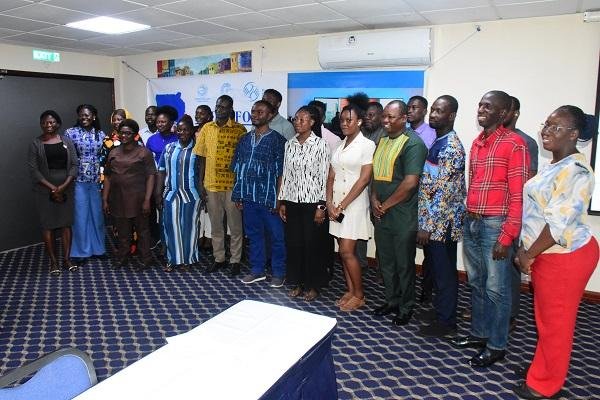News
NSA board sets up committee to supervise digital reforms

The Governing Board of the National Service Authority (NSA) has announced the inauguration of a Transition and Implementation Steering Committee (TISC) to oversee the Authority’s digital transformation agenda.
According to the Board, the move follows a letter dated 17 June 2025 from the Office of the President to the Minister of Youth Development and Empowerment directing the suspension of the existing deployment system, calling for an audit of its operations and instructing the design and deployment of a new digital platform.
The Board explained that the audit had been completed and had found the existing system unsatisfactory.
It indicated that the Minister had written to the Board to begin the necessary legal processes to ensure the contract for the audited system, which expired in August 2025, would not be renewed, and to take further steps toward designing and deploying a new digital platform that would guarantee transparency, security and real-time verification of service personnel postings.
It stressed that the TISC had been established to ensure a smooth and orderly transition from the current National Service Scheme digital platform to a new ICT-led system aimed at improving efficiency, transparency and service delivery.
The Authority outlined the Committee’s mandate as overseeing the phased migration from the legacy system, directing the design and deployment of a modern digital platform, and supervising its operationalisation across core functions including personnel enrolment, postings, payroll, allowances and scheme administration.
It further noted that acting under the directives of the Minister of Youth Development and Empowerment and deriving authority from the NSA Board, the TISC has the power to issue instructions to NSA departments and engage external partners necessary to achieve its mandate through the Governing Board.
The Authority named Dr. Wisdom Atiwoto, a member of the NSA Board and Director of Research, Statistics and Information Management at the Ministry of Health, as chair of the Committee.
Other members include Ms. Ruth Dela Seddoh, Mr. Shadrack Mensah, Ms. Elorm Goh, Mr. Benjamin Freeman Kusi, Ms. Jennifer Opong, Dr. Stephan Nwolley, Mr. Koku Abotsi, Mr. Japhet Kuntu, Mr. Nabil Abubakar Hussayn and Ms. Regina Obenewa Penrose as Secretary.
The NSA Board assured the public and stakeholders of its commitment to innovation, accountability and excellence in service delivery.
It emphasised that there would be no disruption in the fulfilment of its obligations to national service personnel as outlined in the National Service Act, Act 1119 (2024), and indicated that updates on the Committee’s progress would be communicated in due course.
With the collective expertise of its members, the TISC is expected to deliver a robust and future-ready platform that will anchor the next phase of the National Service Scheme’s operations.
By: Jacob Aggrey
News
Lead contamination in products can cause anaemia, brain damage — UNICEF, FDA

Childdren and pregnant women in Ghana are unknowingly being exposed to toxic levels of lead in everyday products, a new study by UNICEF and the Food and Drugs Authority (FDA) has revealed.
The nationwide study, which covered all 16 regions, found dangerous levels of lead contamination in items such as cosmetics, food, and household products, posing significant threat to public health, particularly to children and women of childbearing age.
A statement on the report copied to The Spectator in Accra on Monday explained that several commonly used items contained alarmingly high concentrations of lead.
Lead, a heavy metal used in batteries, paints, ceramics, and other industrial materials, is highly toxic even in small quantities.
Experts warn that it can cause irreversible brain damage, developmental delays, learning difficulties, and behavioural problems in children.
The study stressed that there were no safe levels of lead in the human body.
Traditional eyeliners known locally as kaji kaji or kholi, which many mothers use to brighten their children’s eyes, had contamination levels tens of thousands exceeding permissible limits.
White baked clay, called shire, ayilor, or farinkasa and commonly consumed by pregnant women to ease nausea, also tested positive for lead contamination in about 25 per cent of samples, with the highest rates recorded in the North East and Greater Accra regions.
Ground turmeric, a staple spice used across Ghana, was found to be contaminated in 42 per cent of samples, with particularly high levels in the Greater Accra (84 per cent), Central (75 per cent), and Bono (60 per cent) regions.
Similarly, locally prepared corn-based cereal (Tom Brown) showed lead contamination in 4.4 per cent of samples, mostly from the Eastern Region.
Old plumbing systems and certain cookware were also identified as possible sources of exposure, as lead can leak into drinking water or food during cooking.
The health impacts are severe. Lead exposure can cause anaemia, stunted growth, hearing loss, seizures, and pregnancy complications such as low birth weight and miscarriage.
UNICEF has, therefore, called for immediate national action to address the crisis, calling for public awareness campaigns, stricter enforcement of product safety standards, and routine screening for lead exposure, especially among vulnerable groups.
UNICEF reaffirmed its commitment to supporting the Government of Ghana and relevant partners to eliminate lead exposure and safeguard the health of every woman and child.
By Esinam Jemima Kuatsinu
Join our WhatsApp Channel now!
https://whatsapp.com/channel/0029VbBElzjInlqHhl1aTU27

News
GNAD courts media to promote importance of sign language

THE Executive Director of the Ghana National Association of the Deaf (GNAD), Mr Juventus Dourinaah, has called on the media to take a lead role in promoting inclusivity and accessibility for the deaf and hard-of-hearing persons in Ghana.
He made the call at a media forum last week on the theme “No Human Rights Without Sign Language Rights.” It brought together journalists, development partners, and members of the Deaf community.
The event formed part of efforts to highlight the importance of sign language as a human right and to encourage media institutions to adopt inclusive communication practices.
Mr Dourinaah emphasised that the media was one of the most powerful tools for shaping public perception, influencing policies, and setting national agendas.
“The media holds strong power to influence understanding and build inclusion.”
For deaf persons, he said, access to information through sign language, captioning, and visual communication is not a privilege but rather a human right.
He added that without accessible communication, deaf people remain excluded from national conversations, education, and opportunities that shape their lives.
He therefore urged both public and private broadcasters to integrate sign language interpretation into all news programmes, public service announcements, and major national events.
Mr Dourinaah also appealed to the National Communications Authority (NCA) and the Ministry of Communications (MoC) to make accessibility a mandatory requirement for all media houses.
At the end of the meeting, media representatives in a communique pledged to promote accessibility by including Ghanaian Sign Language interpretation and subtitles in programming.
They also pledged to ensure fair and non-discriminatory representation of deaf persons while collaborating with GNAD to train media personnel on inclusive communication.
Join our WhatsApp Channel now!
https://whatsapp.com/channel/0029VbBElzjInlqHhl1aTU27











